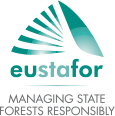ÖBf Viewpoints on Active Forest Management
Should humans backtrack from or actively intervene in the forest with a view to act against climate change, preserve nature and biodiversity or in support of a transition towards a bio-based circular economy?
The interests that various actors have in long-term forest conservation and forest use are extremely diverse, and sometimes contradictory. They cover the production, long term-availability and future use of wood (Europe’s most important renewable raw material), its role in transforming both business and society into a bio-economy and expanding the competitiveness of the forestry and timber sector and its value chains. On the other hand, demand is increasing for protection against natural hazards, the growing demand for recreational and leisure opportunities within forests, the promotion of forest biomass and soils as CO2 sinks, and safeguarding biodiversity in dynamic and highly complex ecosystems.
While the EU Forest Strategy takes more of a conceptual approach to large-scale disuse in this controversial issue of forest disuse versus forest use, Austrian Federal Forests is committed to using forests both actively and sustainably. Sustainable and integrative forest management is being practiced with the aim of forest conservation.
In this publication, reflections and summaries are provided for each of seven viewpoints, using current scientific papers, not to mention federal forest strategies and projects, as a basis. ÖBf would like to use it to emphasize its licence to operate with scientifically reasoned arguments and, in so doing, make a constructive contribution to the political debate.
Published 01/04/2022, Brussels
Mr. Piotr Borkowski
Executive Director
- piotr.borkowski@eustafor.eu
- +32 (0) 474 989 319

